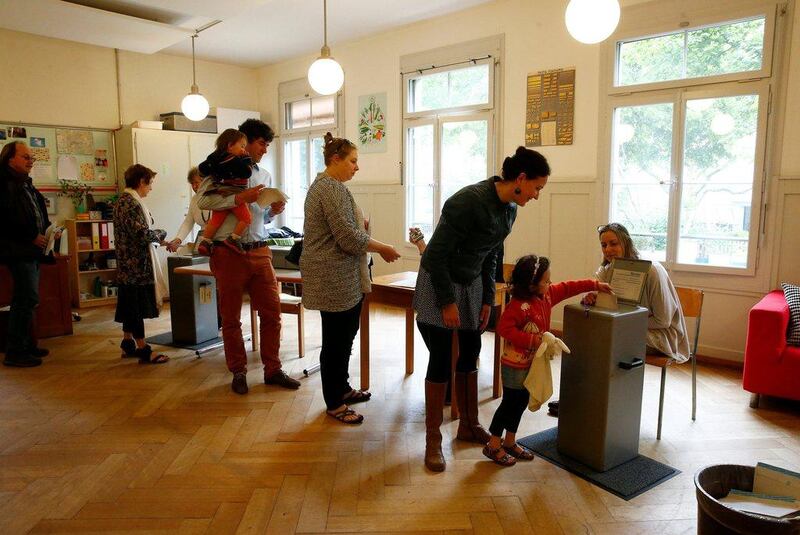Geneva // Swiss voters on Sunday rejected a radical proposal to provide the entire population with a basic income, no work required.
Final results in the referendum showed 76.9 per cent of voters opposed the initiative to provide an unconditional, basic income to each Swiss national, along with foreigners who have been legal residents for at least five years.
Supporters said providing such an income would help fight poverty and inequality in a world where good jobs with steady salaries are increasingly hard to come by.
The group behind the initiative had suggested paying 2,500 Swiss francs (Dh9,410) a month to each adult – considerably less than most workers earn – and 625 francs for each child.
Such a sum, however, would hardly cover basic living costs in Switzerland, which is one of the world’s priciest nations where the median income is above 6,000 francs a month.
The idea, which stirred up debate both in Switzerland and abroad, was embraced in a few counties in the cantons of Jura and Vaud, while several neighbourhoods of Geneva and Zurich voted in favour.
But overall, the response from the 46 percent of eligible voters who cast their ballots was a resounding “no”, in line with the recommendation from the government and nearly all political parties.
The scheme to dish out an income to people whether they work or not was controversial from the start in Switzerland – a country where craftmanship and work ethic are highly valued.
Andreas Ladner, a political scientist at Lausanne University, said the Swiss were realistic in their assessment of the UBI plan. Accepting that people could “be paid without having to work would have been a very big step” for the industrious Swiss.
Critics have slammed the initiative as a Marxist dream, warning of sky-high costs and people quitting their jobs in droves, causing economic chaos.
Authorities estimated an additional 25 billion francs would be needed annually to cover the costs, requiring deep spending cuts or steep tax hikes.
That argument likely hit home with the Swiss who have previously rejected initiatives that would have ushered in a minimum wage and increased paid holidays from a minimum four to six weeks, fearing they would hurt competitiveness.
But supporters of the UBI initiative were not disheartened by the resounding defeat, insisting that their main objective had been to get people talking about the idea.
“We are very happy,” said Ralph Kundig, one of the lead campaigners.
Supporters threw a party in Lausanne to celebrate the 23 per cent of votes they had garnered.
“One out of five people voted for the unconditional basic income, so that is a success in itself,” said Sergio Rossi, an economics professor and a backer of the initiative.
The idea of a basic income has been bouncing around in more radical circles for centuries, but it has only recently entered mainstream thinking.
Concrete projects to introduce some variation of the UBI, albeit at a lower level than what was proposed in Switzerland, are under way in other places, including Finland and the Dutch city of Utrecht.
Yesterday’s referendum came after reformers gathered more than the 100,000 signatures required to hold a popular vote, a feature of the Swiss system of direct democracy.
While the UBI initiative was defeated, several other contentious issues put to the vote sailed through.
A full 66.8 per cent of voters and all 26 cantons embraced a government push to speed up the country’s asylum process, despite harsh opposition from the populist right-wing Swiss People’s Party.
The aim is for most cases to be handled within 140 days or less, compared to the current average of about 400 days.
* Agence France-Presse





